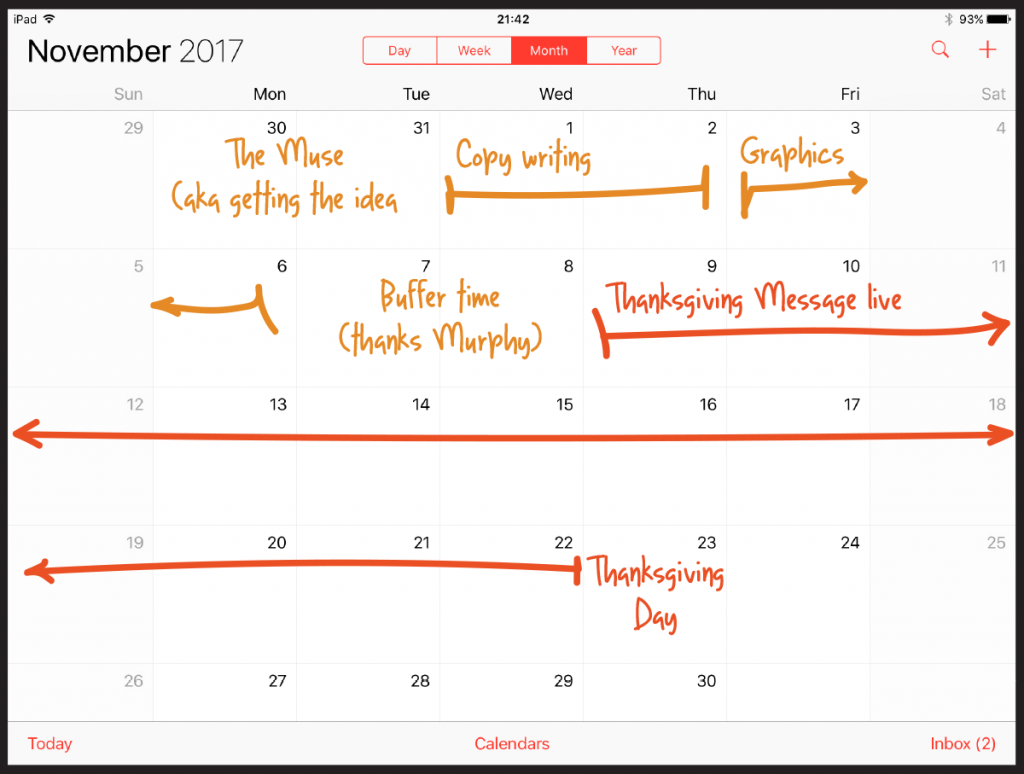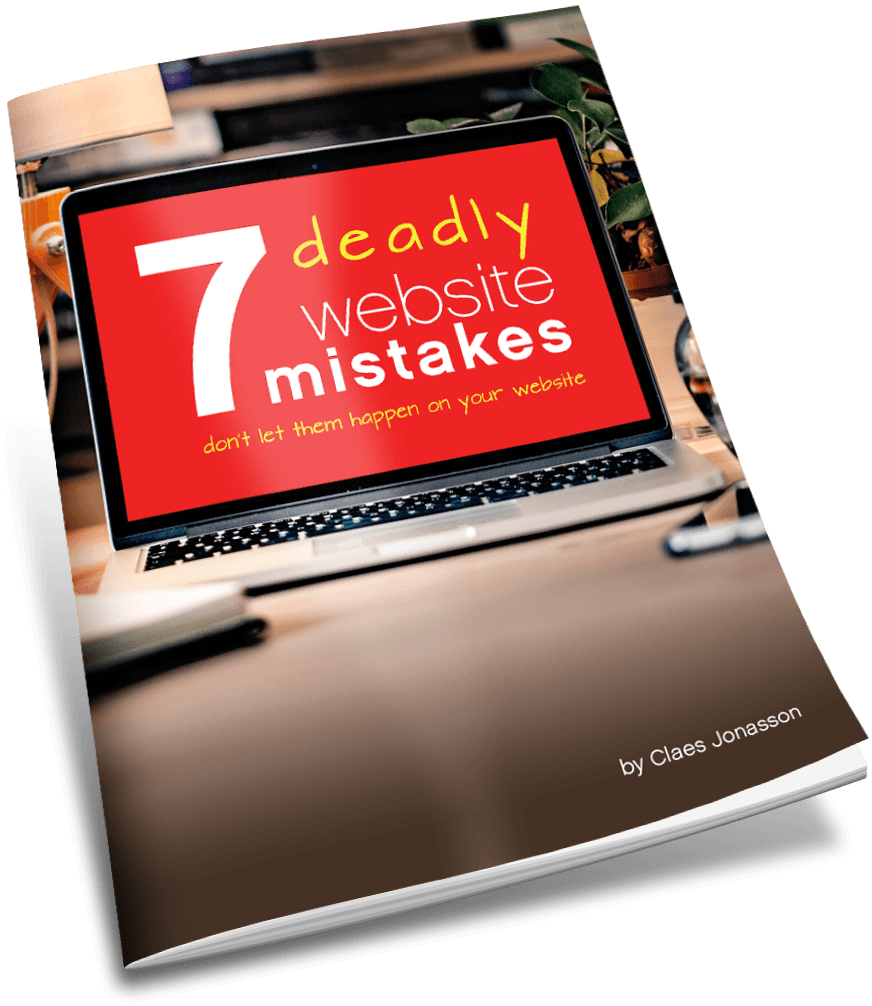Back to the future
“We’re too late to do a full campaign this year, since Thanksgiving is next week,” the Boss said. “But next year, we’ll definitely start earlier and have a killer setup for Black Friday and Cyber Monday.”
Question: Do you think that a year from now the Boss will:
A — have an awesome campaign in place, prepared well in advance and no last minute panic
B — repeat the line above, while promising to really, really have a killer setup for the next year
If you picked B, congratulations, you have keen insight into the Boss’ mind.
I’ve worked in a too many places over the years where last minute seemed to reign (and lost opportunities were abundant).
Wish I’d thought of that sooner
There was the summer job in print shop waaay back in High School. A festival rolled into town and the print shop owner, Lars, had the brilliant idea to sell T-shirts there. Because everyone wants a T-shirt. Never mind that the festival was already going.
Of course, now we were buying the T-shirts (plain, white) at full retail, wherever we could find them in town.
Next we printed those T-shirts and then Lars was off to the festival with his buddies to hawk them. It went well at first. Then not so well.
You have to know your audience demographics to predict sizing quantities. We didn’t.
So the festival ended, Lars was stuck with a bunch of unsold T-shirts in odd sizes and I still wonder if he actually made any money at all.
How different it could have been if he had planned ahead and started several months earlier. T-shirts could have been purchased wholesale at much lower cost and in a proper range of sizes. Arrangements could have been made to make the selling easier and so on.
Broadcast deadlines or the show must go on
When I worked at Iowa State University, I produced an annual TV series that aired on Public TV in Iowa. 4 programs in a series, air dates set in stone months ahead. No fudging. If I didn’t deliver the tape to the TV station by deadline, it didn’t go on. So I had to be sure to set a realistic schedule for how long it would take to write, edit and finish each program. (Research, travel and recording all happened earlier in the year.)
In script writing, I’d send drafts to the content specialists for their input. If none came by the deadline, I moved on and they lost their chance to give input.
In video editing, I had clear goals of how much finished video needed to be created in each hour of editing. Scripts were color coded to show their state of completion so I could tell how much work was left at any given moment
Finally, I’d drive the finished tape over to Iowa Public TV, always with a just a little time to spare.
Most of us in business exist somewhere between those 2 extremes. We hit some deadlines or milestone dates right on and others, well, we’ll try better next time.
Saving Mary
Many businesses function in a cycle. It may be the seasons of the year or events that happen at the same time every year or holidays during the year. For some the cycle mirrors the academic calendar.
Very few businesses/organizations have no cycle at all. If you think you fit in this category, think again about your customers/constituents. What cycles are their lives governed by that might affect how they connect with your business/organization?
I sat down with a small business owner, Mary, who was struggling to have the right message/promotion out to her customers at the right times of the year. I asked her how much it would be worth to her not to worry about that and have it all just happen. “A lot,” she said with no hesitation.
So we pulled out a calendar and an hour later had a rough plan for the next year. Things became much clearer when we looked at a whole year on one sheet of paper.
It didn’t take long to pinpoint the key events and holidays during the year that needed special messaging. Then we could fill in around that with suitable messaging and promotions based on the month or season.
Planning wasn’t that hard. Execution is another matter and Mary was happy to let me worry about that part.
The secret sauce is backtiming (aka starting at the end)
The master calendar has the overview of the year. From there, each event, holiday message, piece of content can be backtimed to when prep needs to start, based on when it’s happening.

Let’s do an example
If Thanksgiving is on November 23, and the Thanksgiving message should be on your website for 2 weeks prior, that means it has to be live on November 9. But we don’t want to get materials delivered “just in time”, because things happen. So allow 2 days for a buffer. Then we know that writing needs 2 days and graphics 2 days. That takes us to 11/3, but that’s if we work through the weekend (we don’t), so really need to start November 1. Prior to that someone has to figure out what the content of the message should be. Figure the muse needs 2 days, so that has to start on October 30.
And there you have it. Start on October 30, everyone does their part and sticks to the milestone dates – life will be good and content published right on schedule.
Here’s the process again:
- Consider every step that goes into producing the product, post or message.
- Assign realistic time to each step.
- Add in a bit of a buffer at the end or between milestones if it’s a long project. Because Murphy.
- You know when it has to be done and live/in use.
- From that count backwards and assign real dates to when each step needs to be started.
As a bonus, the end result will be so much better than the rushed product that happens with no pre-planning.
Rinse and repeat
Yes, it’s a pain to do all that the first time around. Fortunately processes repeat. Events during the year will have similar/same steps and time requirements. This is also true for writing content for your website or holiday messages. It’s getting easier already.
You now have a detailed master calendar that includes important steps along the way. You can look at any given day and see what needs to be done next to keep everything on schedule.
Just one more ingredient: Discipline to actually do these items when they pop up on the calendar. Yes, we built in a little fudge time, but too much fudge, well, it’s not good for the waistline or the deadline.
One more thing
Once the launch date/publication date is past, take a moment right then to review the process. Make notes of what worked well and what didn’t. Adjust the plan for next time.
Because in a year when this rolls around again, you will otherwise have forgotten these lessons. And then it will be relearning all over.
Questions:
Does your business have a master plan for product, content and promotions for the year? How could you improve that plan?
Do you find yourself repeatedly starting out late to prep for the next upcoming thing? What can you do today towards changing that?
Never miss out!
Get an email update every time I publish new content. Be the first to know!

